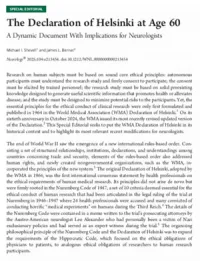The Declaration of Helsinki at 60: Bridging Historical Ethics to Modern Neurology
25 Mar 2025

A special editorial ⧉ published in Neurology® revisits the World Medical Association's (WMA) Declaration of Helsinki ⧉—a milestone document in the ethical regulation of human research—within its historical context and highlighting its most relevant recent modifications for neurologists.
Formulated in 1964, the Declaration of Helsinki is a statement of ethical principles for medical research involving human subjects, including research on identifiable human material and data. The core principles, stemming from the Nuremberg Code (1947) ⧉, emphasise protecting participants by ensuring informed, voluntary consent and requiring research to be grounded in rigorous scientific knowledge to minimise risks.
Celebrating its 60th anniversary in October 2024, the Declaration has evolved through eight revisions and two clarifications to address modern challenges while retaining its ethical foundation. Though not legally binding, it has become a global benchmark for research ethics, directly influencing major frameworks like the US Belmont Report ⧉, Canada's Tri-Council Policy Statement for Ethical Conduct for Research Involving Humans ⧉, and UNESCO's Universal Declaration on Bioethics ⧉.
This special editorial underscores the historical roots of the Declaration of Helsinki, its ongoing relevance to clinical practice, and specific implications for neurology, where ethical rigour is critical given the vulnerability of patients with neurological conditions.
The Declaration of Helsinki at Age 60: A Dynamic Document With Implications for Neurologists
Authors: Michael I. Shevell & James L. Bernat
Open Access
Neurology
2025 Mar 25;104(6):e213454. | DOI: https://www.neurology.org/doi/10.1212/WNL.0000000000213454 ⧉
Web design by Tribal Systems








